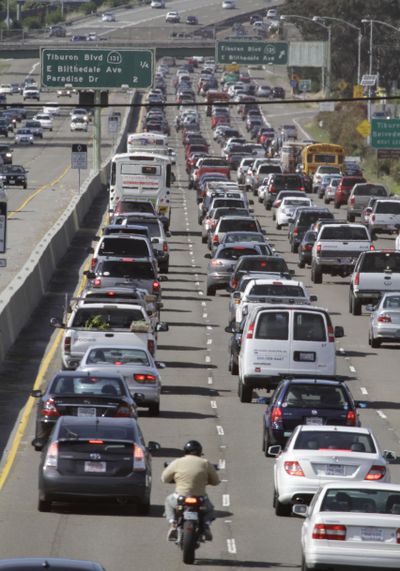California debates new ‘clean car’ regs
Standards often affect owners far beyond the Golden State

SAN FRANCISCO – Auto dealers say California’s proposed rules to require carmakers to build more electric and other less-polluting hybrid cars and trucks by 2025 will cost consumers more money and will stifle the industry’s growth.
Consumer groups say customers might pay more for the vehicles but will save in lower fuel and other costs.
Both sides submitted testimony Thursday during a meeting of the state’s air quality board, which was poised to vote on rules to require that vehicles emit about 75 percent less smog-producing pollutants.
The new standards, which also include big cuts in greenhouse gas emissions, would begin with new cars sold in 2015, and get increasingly more stringent until 2025. The rules also mandate that one of every seven new cars sold in 2025 in the state be a zero-emission or plug-in hybrid vehicle.
California Air Resources Board Chairman Mary Nichols said she hopes the rules lead “the nation and the world.”
“We can’t afford to wait. We have to act on these issues now,” she said at the panel’s meeting. “Our projections show continued growth in population and vehicle miles traveled, which will affect air quality for years to come.”
But the California New Car Dealers Association and other industry groups representing those who sell cars said the board is overestimating consumer demand for electric vehicles and other so-called “zero-emission vehicles.”
Some dealer groups have estimated that $3,200 would be added to the average cost of a car because of the required technological changes, and that consumers have been slow to adopt them.
Jonathan Morrison, of the state dealers’ association, said car retailers are supportive of new technologies that are accepted by their customers, but said the acceptance of electric and other vehicles has been slow.
“Consumers do not make purchasing decisions based upon regulatory mandates,” he said.
The board’s research staff disputes those estimates and says increases in hybrid and other sales continue to rise as more cars hit the market. They argue that fuel cost savings will make up for any vehicle price increase.
“Our research shows a $1,400 to $1,900 car price increase. But over the life of the vehicles, the owners save $6,000 in reduced fuel and maintenance costs,” board spokesman David Clegern said.